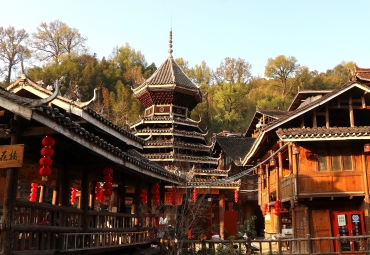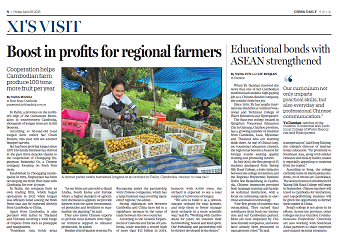A modern wonderland casts its spell

Tourists enjoy a refreshingly cool and clear stream running through the forest in Libo. [Photo by Yao Xiandun/China Daily]
Ecotourism training
First established in 1986, the nature reserve protects the karst forest from the risk of fire, felling and poaching.
About five to six years ago, there were residents of ethnic groups living in the core area of the reserve.
They have been relocated to better protect this unique forest and also for the purpose of poverty alleviation, says Yu Dengli, head of the management bureau of the reserve. Yu has been working there for 28 years.
There used to be other karst forests, but most of them disappeared mainly due to damage caused by humans, says Chen Zhengren, senior engineer with the management bureau. He started working in the Libo karst forest in 1989 soon after graduating from university.
The forest, 200 kilometers to the southeast of Guiyang, Guizhou's capital, has been preserved due to difficult access, a comparatively small population and the local people's respect for nature, Yu says.
About 97 percent of the residents living in the buffer areas of the reserve are people of the Yao, Bouyei and Sui ethnic groups.
For example, Yao people will look for herbs in the forest to treat fever or traumatic injuries and to assist childbirth, so they use the forest, rely on it and respect it, he says.
Sui people take ancient trees and rare-shaped rocks as their totems, and Bouyei people have many rituals to worship nature, he says.
Preserving the forest is important, but people whose ancestors lived there for hundreds of years also need to improve their lives.
The core area is mostly closed to people, but in the "experimental area", Yu and his colleagues have been helping people develop the local economy.
For example, residents are encouraged to raise chicken and fish in rice fields, and grow herbs, red rice and fruit trees, but not in the forest. The management bureau also organizes training programs to help locals develop ecotourism. People living in the buffer areas of the reserve have all been lifted out of poverty in 2019.
"We are allowed to properly use the environment on the basis of preservation," Yu says.
"To use properly is to better protect nature because people will see they can benefit from environmental protection."
With decades of efforts, the forest coverage rate has risen from 87 percent in late 1980s to more than 88.61 percent today, says Chen, adding that researchers are working hard to nurture more endangered plants, and in the future they want to enlarge their population in the wild.
Zhao Yandi and Wang Jin contributed to the story.
All rights Reserved. 京ICP备13028878号-8







 Overview
Overview Guiyang
Guiyang Guian New Area
Guian New Area Liupanshui
Liupanshui Anshun
Anshun Qianxinan
Qianxinan Qiandongnan
Qiandongnan Qiannan
Qiannan Zunyi
Zunyi Tongren
Tongren Bijie
Bijie Guizhou commits to culture preservation and rural vitalization
Guizhou commits to culture preservation and rural vitalization Guizhou voice at 2025 national two sessions
Guizhou voice at 2025 national two sessions Meet the 'genius moms' at Shenzhen cultural fair
Meet the 'genius moms' at Shenzhen cultural fair 

